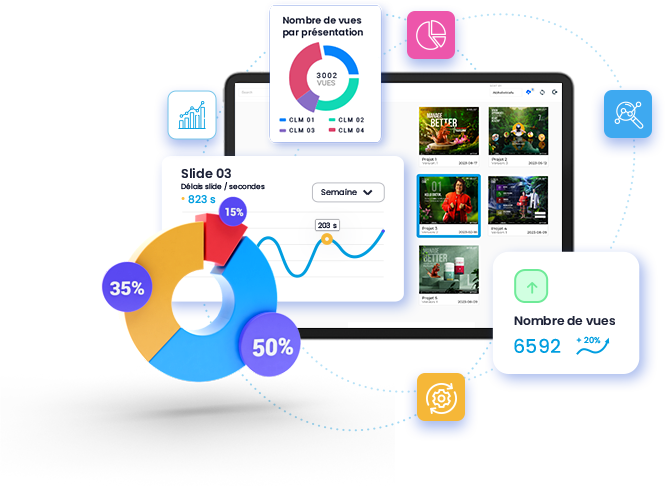Transforming Pharma Marketing: The Power of Closed-Loop marketing and Digital Innovation
Transforming Pharma Marketing: The Power of Closed-Loop marketing and Digital Innovation
Nowadays, pharmaceutical companies face immense challenges in staying competitive and effectively engaging with healthcare professionals and patients. Closed-loop marketing (CLM) has proven to be a powerful strategy. By incorporating innovative digital technologies, CLM has become a key asset for pharmaceutical companies seeking to enhance their marketing and sales strategies.
What is Closed Loop Marketing (CLM) ?
Closed-loop marketing (CLM) is a strategy that integrates feedback from various stakeholders healthcare professionals, sales representatives, and customers into the marketing process. This continuous feedback loop allows pharmaceutical companies to refine their marketing tactics, ensuring they align with the needs and preferences of their target audience.
The Evolution of CLM in Pharma
The concept of CLM has evolved significantly with digital advancements. Modern CLM solutions, such as PrezManager, incorporate advanced analytics and data-driven insights, providing a comprehensive understanding of market dynamics. This digital transformation enables pharmaceutical companies to engage in more personalized and effective communication with healthcare professionals and patients.

Key Benefits of CLM in the Pharmaceutical Industry
Personalized Communication
By continuously collecting and analyzing feedback from healthcare professionals, closed-loop marketing (CLM) enables pharmaceutical companies to create more personalized and relevant marketing content. This feedback is vital for understanding the ever-changing needs and preferences of healthcare providers and patients.
When healthcare professionals provide insights and opinions, pharmaceutical companies can tailor their marketing strategies to address specific concerns and highlight relevant benefits of their products. This personalized approach ensures that the marketing messages resonate more deeply with the target audience, leading to better engagement and stronger relationships.
For example, if feedback indicates that healthcare professionals seek more detailed information on a product’s side effects, companies can adjust their content to include comprehensive data and studies.
Enhanced communication also extends to the way information is delivered. CLM allows for the creation of dynamic, interactive content that can be adjusted based on real-time feedback. This adaptability makes marketing campaigns more effective, as they can be fine-tuned to maximize impact and relevance. As a result, the overall customer experience is significantly improved, fostering trust and loyalty between pharmaceutical companies and their stakeholders.
Omnichannel Marketing
Pharmaceutical companies can tailor their communications to individual needs by leveraging data from various sources, such as social media, email campaigns, webinars, and face-to-face meetings. For instance, if a healthcare professional frequently engages with educational content online, personalized email newsletters with similar information can be sent to maintain their interest. Conversely, if another professional prefers in-person interactions, scheduling more frequent face-to-face meetings or virtual consultations can enhance engagement.
Omnichannel marketing enables a seamless and cohesive customer journey, where each interaction builds on the previous one, regardless of the channel used. This integration ensures that customers receive consistent and relevant messaging, enhancing their overall experience and increasing the likelihood of positive responses. By understanding and catering to customer preferences, pharmaceutical companies can significantly improve engagement and response rates, ultimately driving better outcomes for both the company and its clients.
Edwin Erckens : Chief Digital technology officier UCB Biopharma “Now there’s another period of acceleration, because everybody realises it’s not about ‘CRM’ or ‘salesforce automation’ anymore, it’s really going to omnichannel marketing and customer engagement.”
Prez Manager: A revolutionary CLM Solution for Pharmaceutical Industry
PrezManager stands out as a comprehensive CLM solution tailored for the pharmaceutical industry that adheres to pharma medical and legal standards. It incorporates features like augmented reality (AR) and video conferencing. This allows pharmaceutical sales representatives to deliver engaging and interactive presentations, even virtually. Additionally, PrezManager ensures that all pharmaceutical documents undergo rigorous medical and legal validation, maintaining compliance with regulatory standards.
Integration of Augmented Reality (AR)
Prez Manager stands out for its integration of augmented reality (AR), a cutting-edge feature that transforms traditional presentations into immersive and interactive experiences. Pharmaceutical sales representatives can leverage AR to bring their products to life, creating a dynamic and engaging way to showcase complex pharmaceutical products and their mechanisms of action.
With AR, the intricate details of pharmaceutical products become more accessible and comprehensible. For instance, sales representatives can visually demonstrate how a drug interacts with the body at a molecular level, providing a 3D representation of its effects on various biological systems. This enhanced visualization aids in conveying the product’s benefits more effectively, facilitating a deeper understanding for healthcare professionals and clients.
Furthermore, AR can simulate real-world scenarios where the pharmaceutical product is used, helping to illustrate its practical applications and benefits in a realistic context. This not only makes the demonstration more captivating but also enhances the educational value, ensuring that the audience retains the information more effectively.
By incorporating AR, Prez Manager not only improves the quality and impact of sales presentations but also positions itself at the forefront of technological innovation in the pharmaceutical industry. This advanced feature is instrumental in helping sales representatives make a lasting impression, fostering better engagement, and ultimately driving sales success.
Integrated Video Conferencing
Prez Manager offers seamless integration with leading videoconferencing platforms like Microsoft Teams and zoom, elevating the quality and effectiveness of virtual presentations. This feature enables pharmaceutical sales representatives to conduct high-quality, interactive sessions with their clients, regardless of geographic barriers.
In the modern business environment, where remote work and virtual meetings have become the norm, Prez Manager’s integrated videoconferencing capability is particularly valuable. Sales representatives can schedule and conduct live presentations, ensuring they maintain a personal connection with healthcare professionals and clients. Real-time interaction is facilitated, allowing for immediate feedback, questions, and discussions, which are crucial for building strong client relationships and ensuring clarity of information.
The high-definition video and audio quality provided by integrated platforms ensure that presentations are professional and engaging. Representatives can share their screens to display detailed product information, charts, and augmented reality (AR) demonstrations directly within the videoconference. This integration ensures a smooth and uninterrupted experience, combining the best of both virtual interaction and advanced presentation tools.
Moreover, the flexibility of videoconferencing means that sales teams can efficiently manage their schedules and reach a wider audience without the constraints of travel. This not only saves time and resources but also increases the frequency and reach of sales interactions. In contexts where face-to-face meetings are limited, such as during global health crises or for clients in remote locations, the ability to conduct comprehensive virtual presentations becomes a significant advantage.
In summary, Prez Manager’s integrated videoconferencing feature transforms how pharmaceutical sales representatives connect with their clients. It combines the convenience and reach of virtual meetings with the rich, interactive capabilities of advanced presentation tools, ensuring that sales representatives can deliver impactful and effective presentations in any situation.
Regulatory Compliance
All CLM materials adhere to medical and legal standards. Regulatory compliance is critical in the pharmaceutical industry, where marketing materials must meet strict standards to ensure they are accurate, truthful, and not misleading. CLM systems help manage this complexity by incorporating built-in compliance checks and workflows that guide the creation and approval of marketing content. These systems ensure that all content undergoes thorough review and validation before it is released, reducing the risk of non-compliance.
CLM solutions like Prez Manager, include robust features for regulatory validation, simplifying the approval process and maintaining compliance across all marketing activities.
Prez Manager, offers tools that track and document every step of the approval process, providing a clear audit trail. This transparency is crucial for regulatory authorities and helps pharmaceutical companies demonstrate their commitment to compliance. Additionally, the platform can update compliance guidelines automatically, ensuring that all marketing activities remain aligned with the latest regulations.
By streamlining the compliance process, CLM systems like Prez Manager not only reduce the administrative burden on marketing teams but also speed up the time-to-market for new campaigns. This efficiency allows companies to respond more quickly to market changes and opportunities while maintaining the highest standards of regulatory compliance.
Implementing a Successful CLM Strategy
To implement a successful closed-loop marketing (CLM) strategy, pharmaceutical companies should focus on several key aspects to ensure that their marketing efforts are both effective and compliant. Here’s a detailed breakdown of each aspect:
Customer Segmentation
Identifying and segmenting customers based on their needs, preferences, and behaviors is crucial for delivering personalized content. By analyzing demographic data, purchase history, and interaction patterns, pharmaceutical companies can create distinct customer segments. Each segment can then receive tailored marketing messages that resonate more deeply with their specific concerns and interests.
For example, healthcare professionals specializing in cardiology may have different informational needs compared to those in dermatology. By segmenting these groups, companies can deliver targeted content that addresses the unique aspects of each specialty, thereby increasing the relevance and impact of their marketing efforts.
Data Integration
Integrating data from various sources is essential for gaining a comprehensive understanding of customer interactions and insights into market trends. Data from digital platforms, in-person meetings, customer service interactions, and sales records should be combined to create a unified view of each customer.
Effective data integration enables pharmaceutical companies to track customer journeys across multiple touchpoints, identify patterns, and predict future behaviors. This holistic view supports more informed decision-making and allows for more precise targeting in marketing campaigns.
Content Personalization
Tailoring marketing content to address the specific needs and interests of each customer segment ensures relevance and engagement. Personalized content can range from customized email newsletters and product recommendations to personalized webinars and targeted advertisements.
By leveraging the insights gained from customer segmentation and data integration, pharmaceutical companies can create highly relevant content that speaks directly to the concerns and interests of their audience. Personalized content not only enhances engagement but also builds trust and loyalty among healthcare professionals and patients.
Feedback Loops
Establishing mechanisms to collect and analyze feedback from customers is vital for continually refining and improving marketing efforts. Feedback can be gathered through surveys, direct interactions, social media monitoring, and other channels.
Analyzing this feedback helps pharmaceutical companies understand what is working and what needs improvement in their marketing strategies. It also allows them to respond quickly to customer concerns and preferences, ensuring that their marketing efforts remain relevant and effective. Feedback loops create a dynamic marketing environment where strategies can be adjusted in real-time based on customer input.
Technology Adoption
Investing in the latest marketing technologies and tools like PrezManager is crucial for streamlining processes and enhancing the overall CLM strategy. Advanced tools offer features such as automated data integration, real-time analytics, and robust compliance checks, which simplify and enhance marketing operations.
Prez Manager, for example, provides pharmaceutical companies with a comprehensive platform that includes augmented reality (AR) for immersive presentations, integrated videoconferencing for virtual interactions, and tools for ensuring regulatory compliance. These technologies not only improve the efficiency of marketing efforts but also elevate the quality of customer engagement.
